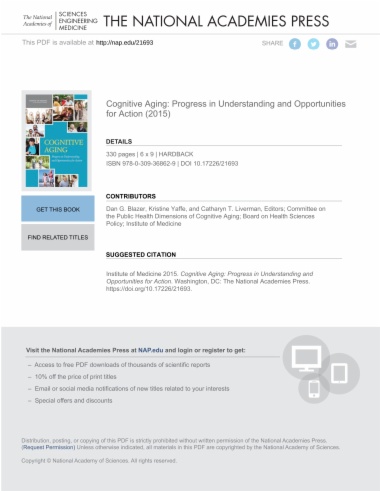

For most Americans, staying "mentally sharp" as they age is a very high priority. Declines in memory and decision-making abilities may trigger fears of Alzheimer's disease or other neurodegenerative diseases. However, cognitive aging is a natural process that can have both positive and negative effects on cognitive function in older adults - effects that vary widely among individuals. At this point in time, when the older population is rapidly growing in the United States and across the globe, it is important to examine what is known about cognitive aging and to identify and promote actions that individuals, organizations, communities, and society can take to help older adults maintain and improve their cognitive health.
Cognitive Aging assesses the public health dimensions of cognitive aging with an emphasis on definitions and terminology, epidemiology and surveillance, prevention and intervention, education of health professionals, and public awareness and education. This report makes specific recommendations for individuals to reduce the risks of cognitive decline with aging. Aging is inevitable, but there are actions that can be taken by individuals, families, communities, and society that may help to prevent or ameliorate the impact of aging on the brain, understand more about its impact, and help older adults live more fully and independent lives. Cognitive aging is not just an individual or a family or a health care system challenge. It is an issue that affects the fabric of society and requires actions by many and varied stakeholders. Cognitive Aging offers clear steps that individuals, families, communities, health care providers and systems, financial organizations, community groups, public health agencies, and others can take to promote cognitive health and to help older adults live fuller and more independent lives. Ultimately, this report calls for a societal commitment to cognitive aging as a public health issue that requires prompt action across many sectors.